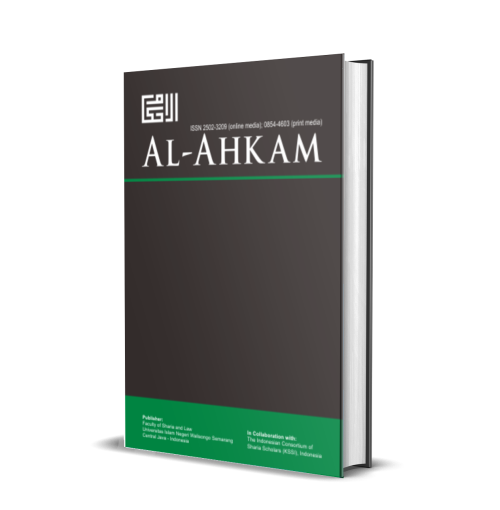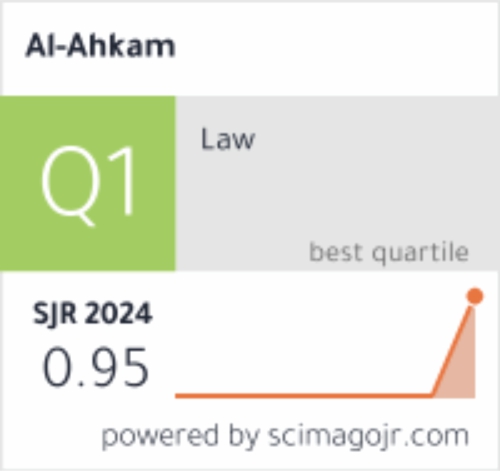FATWA ALIRAN SESAT DAN POLITIK HUKUM MAJELIS ULAMA INDONESIA (MUI)
DOI:
https://doi.org/10.21580/ahkam.2015.25.2.810Keywords:
MUI, aliran sesat, politik hukumAbstract
MUI (The Indonesian Council of Ulama) is an institution established by the government of Indonesia that one of its functions is to formulate religious fatwas. The existence of the MUI as the representatives of various religious organizations, and therefore claimed to be the big tent of Muslims, became the basis for the existence of these functions. Nevertheless MUI’s fatwas on religious denominations in Indonesia, is considered partly responsible for the occurrence of discriminatory behavior and violence based on religion. This article would like to see the political aspects of the law on the MUI’s fatwas about the deviant groups which is considered as a barrier of religous freedom in Indonesia and at the same time as the trigger acts of violence based on religion. MUI’s fatwas about the deviant groups can be analyzed in at least two approaches. First, in the perspective of the discourse of blasphemy, and second from the perspective of the discourse of legal pluralism, institutionalizing MUI, and theology.Downloads
References
Asad, T., Free Speech, Blasphemy, and Secular Criticism. In Is Critique Secular?: Blasphemy, Injury and Free Speech, Berkley: University of California Press, 2009.
Fauzi, I. A., & Panggabean, S. R., Pemolisian Konflik Agama di Indonesia, Jakarta: Paramadina, 2014.
Hasan, Noorhaidi, Laskar Jihad, Ithaca: SEAP Publications, 2006.
Hilmy, Masdar, Islamism and Democracy in Indonesia, Singapore: ISEAS, 2010.
Hosen, Nadirsyah, “Behind the Scenes: Fatwas of Majelis Ulama Indonesia”, Journal of Islamic Studies, 2 (15), 2004.
Ibn al-Ṣalāh, Fatāwā wa Masā’il Ibn Ṣalāḥ fī ‘l-Tafsīr wa ‘l-Ḥadīth wa ‘l-Uṣūl wa ‘l- Fiqh wa Maʿahu Adab al-Muftī wa ‘l-Mustaftī, (ʿAbd al-Muʿṭī Amīn Qalʿajī, Ed.), Beirut: Dār al-Maʿrifa, 1986.
Ismail, Salwa, Rethinking Islamis Politics: Culture, the State and Islamism, London & New York: I.B. Tauris, 2006.
Marjoned, Ramlan, K.H. Hasan Basri 70 Tahun: Fungsi Ulama dan Peranan Masjid, Jakarta & Kuala Lumpur: Media Da'wah, 1990.
MUI, Mengawal Aqidah Umat: Fatwa MUI tentang Aliran-aliran Sesat di Indonesia, Jakarta: Sekretariat Majelis Ulama Indonesia, t.th.
MUI, 15 Tahun Majelis Ulama Indonesia, (H. S. Prodjokusumo, Ed.), Jakarta: Sekretariat Majelis Ulama Indonesia, 1990.
MUI, Himpunan Fatwa Majelis Ulama Indonesia, Jakarta: Departemen Agama, 2003.
MUI, Fatwa Majelis Ulama Indonesia tentang Terorisme, Jakarta: Majelis Ulama Indonesia, 2005.
Nash & David, Blasphemy in the Christian World, New York & Oxford: Oxford University Press, 2007.
Risalah Mahkamah Konstitusi, Risalah Sidang Perkara No. 140/PUU-VII/2009.
The International Council on Human Rights Policy, When Legal Worlds Overlap: Human Rights, State and Non-State Law, Switzerland: ICHRP, 2009.
Wahid, A., Tuhan Tidak Perlu Dibela, LKiS, 1999.
Weiss, B. G., The Spirit of Islamic Law, Georgia: University of Georgia Press, 2006.
Downloads
Published
How to Cite
Issue
Section
License
By submitting an article to the journal, the author(s) agree to transfer the published article's copyright to the journal, which will act as the publisher. This means the journal will have the right to publish the article in various forms, including reprints. The journal will maintain the publishing rights to the published articles.
In line with the license, authors and third parties (readers, researchers, and others) are allowed to share and adapt the material. In addition, the material must be given appropriate credit, provided with a link to the license, and indicated if changes were made. If authors remix, transform or build upon the material, authors must distribute their contributions under the same license as the original.




